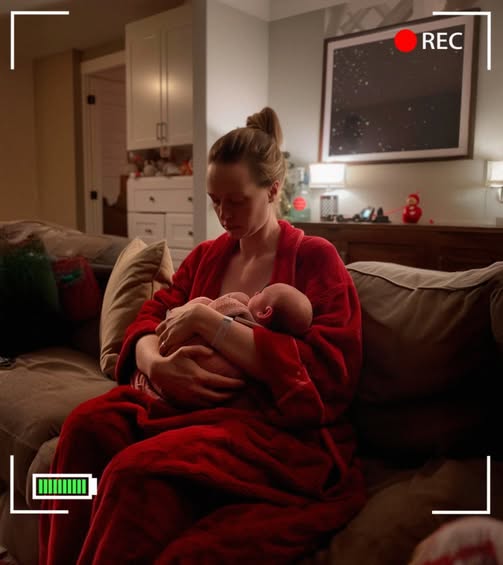When my mother-in-law begged for access to our baby monitor to feel closer to her granddaughter, I hesitated—but eventually relented. At first, her sweet, loving texts seemed harmless, even heartwarming. But soon, the comments started to feel… personal. That’s when I realized she wasn’t just watching our baby—she was watching me.
I was barely recovered from childbirth when her call came through.
You know that moment when even walking to the bathroom feels like a marathon? That was me, still tender and exhausted, when her voice reached me, thick with emotion.
“My heart is breaking that I can’t be there,” she sniffled.
We live on the East Coast; she’s in California. Honestly, the distance has always worked in our favor. My mother-in-law, Linda, can be… overwhelming. I’ve always done my best to be kind, to keep the peace, but more frequent contact would test my limits—and maybe my marriage.
“I just want to feel close to that precious little girl,” she continued. “Please, could I have access to the baby monitor? I can’t visit often, and it would mean so much to see her grow up.”
I immediately regretted telling her we had a camera that streamed via an app.
Inviting her into the nursery at all hours felt like leaving our front door wide open. But my husband, ever the peacemaker, squeezed my hand.
“It’ll make her feel connected,” he whispered. “She just wants to see the baby.”
So I said yes. Sweet, I told myself. Just a digital grandma trying to share in the miracle.
At first, it was exactly that. She’d text messages like, “She looks like an angel when she sleeps 😍,” or “That stretch she did with her arms?? My HEART.”
It warmed me to have someone share those tiny, sleepless hours with me.
But then things shifted.
I started noticing the messages weren’t always about the baby. One morning, after a late-night feeding, I found a text: “Looks like you were up late!”
My stomach sank. Linda had always been a boundary-challenged presence, but this… this was different.
Soon after, during a private moment—singing a quiet song to soothe Emma—I received:
“Interesting choice of song. You always go for the sad ones, don’t you?”
Okay. Weird. But maybe a slip.
Then the proof hit me like a cold splash of water.
My sister burst into the nursery, phone in hand, holding up a screenshot.
“Have you seen—” she started.
I cut her off. “You could knock,” I said, shutting the door behind us.
“It’s worse than that,” she said, showing me the screen: it was a photo of me in my milk-stained robe, breastfeeding Emma, posted on Facebook. The caption? “Should I tell my DIL she should invest in a nicer robe if she wants to stay attractive for my son? This one’s seen enough milk 😳😅”
I froze.
One post was bad enough. Then came another: Emma crying, captioned: “Some moms just don’t get how to soothe 🙄.”
Another: me yawning beside the crib, exhausted, with: “When you think a $400 baby swing will save your sleep but you still look like this 😬 #newmomlife.”
It wasn’t love or longing. It was surveillance—and ridicule.
I confronted my husband that evening. He shrugged.
“She’s just being observant,” he said. “It’s not that deep.”
“Not that deep?” I snapped. “She posted a photo of me breastfeeding! She commented on my body!”
“She’s probably trying to be funny. We didn’t grow up with boundaries like that.”
Right. So now my most intimate moments were public property.
I quietly revoked her access to the camera, without telling him.
The next morning, his phone buzzed: “Is something wrong with my Nanit app? The feed isn’t loading.”
He confronted me. “You went behind my back?”
“Yes. I don’t need permission to stop being spied on in my own home,” I said.
We argued. He left for work in a huff. I was left fuming—but then my sister stepped in.
Two days later, she organized a surprise Zoom family game night. During it, she shared her screen—Linda’s Facebook page, open, showing all the photos and captions.
“Tonight, we’re playing a game called Invasion or Support?” my sister announced.
One by one, she showed the posts, reading captions aloud. Silence followed. No one defended Linda. Fifteen minutes later, she had left the call in embarrassment.
The aftermath was immediate. My father-in-law privately messaged: “I had no idea she was doing this.”
My husband finally saw the full picture. “I… didn’t know it was that bad,” he admitted.
I laid down the law: “If you ever give her tech access again without asking me first, you can sleep in the crib.”
Linda tried to soften it. “It was just a joke. Generational differences.”
I left her on read.
Some lines, especially when they involve my child, my body, and my home, don’t get crossed twice.
Looking back, my sister was the true hero. She held up a mirror, not just to my mother-in-law—but to my husband, who had been all too ready to dismiss the invasion of privacy.




